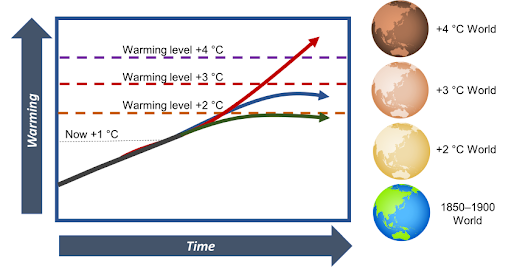
Tropical deforestation is a significant driver of global warming and climate change, posing grave threats to ecosystems, biodiversity, and human societies. Deforestation, especially in tropical regions, involves the large-scale removal of trees and vegetation, primarily for agricultural expansion, urban development, and logging. This process disrupts the balance of the carbon cycle, releasing large amounts of carbon dioxide (CO₂) into the atmosphere, which contributes to global warming. The relationship between tropical deforestation and climate change is a key concern, as forests play a vital role in regulating Earth’s climate and maintaining ecological balance.
Carbon Sequestration by Tropical Forests
Tropical forests, e.g. the Amazon Congo and Southeast Asian rainforests are often described as the lungs of the Earth because they sequester CO₂ from the atmosphere through photosynthesis, converting it to oxygen. They sequester a lot of carbon in their biomass which acts as carbon sinks. The Amazon rainforest holds more than 100 billion tons of carbon.
Tropical Deforestation and Global Warming: The Interconnection with Climate Change
When that land is cleared, often through logging or burning, the carbon hibernating in those old-growth forests re-enters the atmosphere as CO₂. Such massive pulse of carbon has facilitated the greenhouse effect that results in holding heat longer and temperatures soaring to levels never seen even after healthy sources had NY been burned. Deforestation is to blame for about 10% of global greenhouse gas emissions, which means it has a significant impact on climate change.
Climate Change and its Cascading Feedback Loops
Climate Challenges – Shifting the global mindset with leading paradigms, Part 2 Tropical deforestation is wiping out human history along with much of the Amazon and it intensifies climate change by creating dangerous feedback loops. The destruction of forests does not just result in the release of stored carbon — trees play a role in sequestering CO₂ emitted by burning fossil fuels. The result is a positive feedback loop: more deforestation means more CO₂ in the atmosphere, which leads to higher temperatures and changes in weather patterns that increase the frequency of extreme weather events.
Furthermore, forest loss leads to disruptions in water cycles locally and globally. Lastly, trees release moisture in the atmosphere through a process called transpiration. Clouds form, and precipitation, especially in the tropics, benefits from this moisture. Deforestation causes the reman rainfall to reduced, increased droughts and desertification. In addition to deforestation, these climatic shifts contribute to the fragmentation and decline of remaining forests that in turn contribute back to this destructive feedback loop of deforestation and climate.
Biodiversity and Ecosystems Impacts
Of course, the consequences of tropical deforestation are not limited to carbon emissions. Forests have a very rich diversity comprising of numerous species of plant, animal and Micro organisms. Deforestation results in the destruction of animal habitats and consequent endangerment of species that need these ecosystems to survive. As biodiversity declines, ecosystems lose the resilience they need to absorb and buffer the impacts of global heating – from more frequent droughts and floods to increased outbreaks of pests and diseases.
These people may live in or near the tropical forests that are being destroyed. These forests are a source of food, fuel, medicines and shelter for people in these communities. With the disappearance of forests, they lose traditional jobs and are compelled to migrate or even worse adapt to unsustainable lifestyles.
SOLUTIONS: End Deforestation and Address the Climate Crisis
Tropical deforestation is one important area in which climate change action needs to be addressed. Some of the common solutions include the more stringent control of illegal logging practices, promoting sustainable agricultural practices, and reforestation respectively afforestation projects. The time has come for a multifaceted global effort to lower the demand for forest-risk commodities (mostly palm oil, soy and beef) by governments, international organizations, and the private sector working together.
In addition, carbon pricing mechanisms–including carbon credits and taxes–have the potential to value tropical forests in economic terms, thus providing incentives for their conservation. Maintaining the rights of indigenous peoples, who are also usually the most successful forest guardians, is another essential part of conservation efforts.
Conclusion
Tropical deforestation is also connected to stronger global warming and consequently climate change. The destruction of this nature, which acts as a digestive system for the planet, releases massive amounts of carbon dioxide that enhances the greenhouse effect and impacts global weather patterns. To help stop climate change, tropical forests need to be defended and deforestation needs to be reduced and there must be investment in reforestation. → The protection of balance in the ecosystem is not only essential for conservation but also imperative to our survival amidst an environment that threatens to lead us into an unsustainable future.







